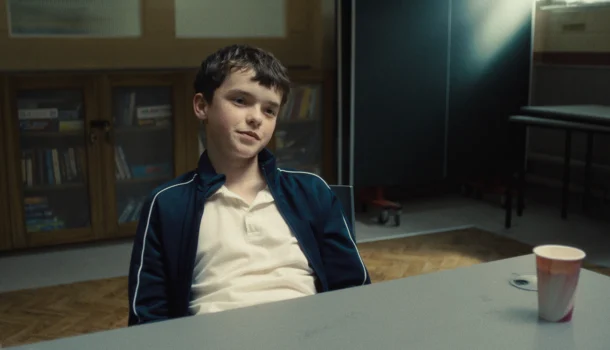Adolescence rarely shows itself in the mirror in its rawest form. What we usually see are filtered versions, shaped by narrative conventions that smooth out the chaos and mask the unrest. The Netflix miniseries begins from the opposite premise: it strips each layer with surgical precision, refusing any shield between character and viewer. At the heart of this radical experience is Jamie Miller, a teenager caught mid-collapse and embodied by Owen Cooper, who, in his debut performance, lands a direct blow to the audience’s emotional complacency. There is no room here for idealizing youth. What emerges is the devastating impact of premature responsibility, the dizzying weight of choices no fifteen-year-old should be forced to make.
This intensity isn’t limited to script choices — it permeates a cast that understands the weight of silence, hesitation, and looming ruin. Stephen Graham, in one of the most harrowing roles of his career, constructs a father who doesn’t attempt to rewrite the narrative or seek excuses, but instead sinks into the abyss between what he should have seen and what he chose to ignore. His restrained gestures speak louder than any outburst. The cinematography, in tune with this emotional starkness, rejects the polish of theatricality and fuses itself to the dryness of everyday life. Nothing feels fabricated. Every shot bears the texture of the real world, and the camera acts as an uneasy witness — always close, never invasive.
The police investigation surrounding the crime serves as more than a narrative thread; it becomes a fragmented mirror reflecting the moral complexity surrounding every character. Ashley Walters and Faye Marsay, playing detectives Bascombe and Misha Frank, exude the institutional fatigue of those who’ve seen too much and understood too little. There is, however, a narrative imbalance that hints at unrealized potential. An additional episode might not resolve the silences, but it would allow deeper excavation of the clues the script chooses to leave suspended. Still, the power of the series lies not in the answers, but in the raw exposure of the questions no one wants to ask — especially those that turn parents into judges of their own children.
Rather than choosing the easy path of redemption or the conventional arc of downfall and rise, the miniseries navigates the unstable terrain of moral ambiguity. There are no absolute innocents, no textbook villains. What we see are young people confronted with dilemmas far beyond their judgment and adults paralyzed by retrospective guilt. In this landscape, Owen Cooper doesn’t act — he inhabits the character with such organic force that the viewer forgets an actor is even on screen. His presence isn’t flamboyant — it’s undeniable. He seeks no approval; he merely exposes the fractures of a juvenile soul under extreme pressure.
There’s something deeply unsettling in how the series manipulates time. Scenes stretch not out of stylistic vanity, but because discomfort must be allowed to mature within the viewer. The slowness is method, not flaw. It’s in this pacing that the series delivers its most effective form of violence: psychological. Dialogue is sparse, and when it occurs, it feels less like communication and more like survival. Silence, then, becomes the emotional grammar of the characters — a language the audience must learn to grasp the scale of the tragedy.
If the goal was to rebuild the collective imagination surrounding adolescence in crisis, the miniseries achieves it with devastating accuracy. But it doesn’t stop there: it breaks with the tradition of portraying youth as either promise or threat and instead views it as a subject already riddled with contradictions, fears, and irrecoverable potential. Cooper’s performance may well be remembered as a turning point not just in his career, but in the very way British drama portrays youth on the verge of collapse. More than introducing a new talent, the series sets a new benchmark for narratives that dare to touch the exposed nerve of human experience.
What lingers after the final episode is not a moral verdict or a sense of catharsis. What remains is a persistent unease — like a question that won’t quiet down, like a gesture left incomplete. And it is in this unsettling residue that the series finds its greatest power: not in what it delivers, but in what it refuses to resolve. By confronting adolescence with clarity and coldness, the miniseries forces the viewer to face what they’d rather ignore — that the fall of a young person is not merely a detour, but a symptom — and that the adults around them are often complicit through silence.
Series: Adolescence
Creators: Stephen Graham, Jack Thorne
Year: 2025
Genres: Crime/Thriller/Drama/Mystery
Rating: 10

